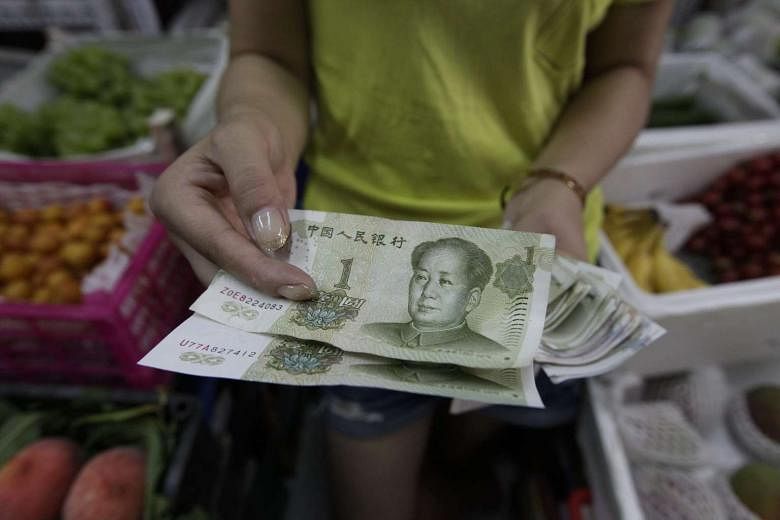1. What did China do?
In a surprise move on Tuesday (Aug 11) - and then again on Wednesday - China devalued its tightly controlled currency, roiling global financial markets and driving expectations the yuan could be set for further falls.
On Tuesday, the People's Bank of China (PBOC) set a centre point for the yuan that was 1.9 per cent below Monday's level - the largest cut since China unified official and market exchange rates in 1994. A near two per cent move in the yuan's value is dramatic for a currency whose daily moves have been a maximum 0.01 per cent for a month.
On Wednesday, the central bank cut this rate by 1.62 per cent from Tuesday's level. The move took the reductions this week to 3.5 per cent.
Unlike, say the US dollar or euro, the yuan is not freely traded. China tightly controls the value of its currency by setting a daily rate for the yuan versus the US dollar. In China's domestic market, traders are allowed to push the yuan 2 per cent stronger or weaker for the day from this central "reference rate".
The central bank described Tuesday's cut as a one-off depreciation, but it also said that market forces will play a greater role in its yuan setting. Previously, the PBOC based the yuan fixing on a poll of market-makers, but it said it will now also take into account the previous day's close, foreign exchange supply and demand and the rates of major currencies.
On why a second cut on Wednesday, the PBOC said this was based on analysis of fresh economic data and improved quotation mechanism. But it added that there was no basis for a sustained depreciation in the yuan given global and domestic economic conditions.
2 Why did China devalue the yuan?
The central bank said it took action because the yuan has been rising in value when market forces indicated it should have fallen. The yuan has been pushed up because its exchange rate is heavily influenced by the US dollar, which has been strengthening on expectations of a hike in US interest rates.
But the devaluation is widely seen as a move to bolster the economy which is struggling to achieve its 7 per cent growth target. And indeed a senior official from China's Commerce Ministry said on Wednesday that the move will help exports.
Over the weekend, China reported that its exports plunged by an unexpectedly wide margin of 8.3 per cent in July. The currencies of other developing countries have also fallen, making Chinese exports relatively more expensive.
3. What has been the immediate impact on markets?
The yuan devaluation has rippled across the globe, sending already weak regional currencies and commodities tumbling.
Currencies fell on fears a weaker yuan could threaten other economies in the region that compete with Chinese exports and encourage their central banks to devalue their currencies to stay competitive.
Malaysia's ringgit weakened to more than 4 per US dollar for the first time since the 1998 Asian financial crisis, while the Indonesian rupiah also traded at the weakest in 17 years. The Australian and New Zealand dollars, whose economies rely heavily on resources, touched six-year lows.
Singapore's currency slid to a five-year low against the US dollar, which pushed the benchmark Sibor interest rate to a four-month high. The Malaysian ringgit fell to its weakest against the Singapore dollar on record.
Oil and industrial metals like copper, aluminium and nickel also tumbed on fears the weaker yuan will slow demand for imports of dollar-denominated raw materials from China, the world's biggest consumer of metals and energy.
4. What are the wider economic implications?
One, it signals to the world that Beijing thinks the Chinese economy is struggling and that this drastic move is needed to get it going again.
Two, it could also result in a new Asian currency war. Yuan devaluation puts pressure on other central banks around the world to push down their own currencies to help their own exporters and to prevent destabilising capital flows.
Three, it could delay a highly anticipated hike in US interest rates by the Federal Reserve. The yuan's devaluation has put even more upward pressure on the US dollar. Continued dollar strength is problematic for the Fed since it hurts exports and lowers inflation as well as weakens corporate profits.
5. What are the political implications?
In the US, it could reignite criticism that Beijing is manipulating its currency to help its own exporters - a charge that could get added boost because of the US presidential election campaign. But as the Associated Press reported, Tuesday's change presents a dilemma for US policymakers as China said its yuan move is aimed at trying to make its exchange-rate system more market-oriented - a step Washington has been pressing Beijing to take.
If it's seen as market manipulation, it could also complicate China's efforts to get the yuan added to a basket of currencies tracked by the International Monetary Fund - efforts aimed at giving the yuan greater acceptance abroad.
Sources: Wall Street Journal, CNBC, Associated Press


